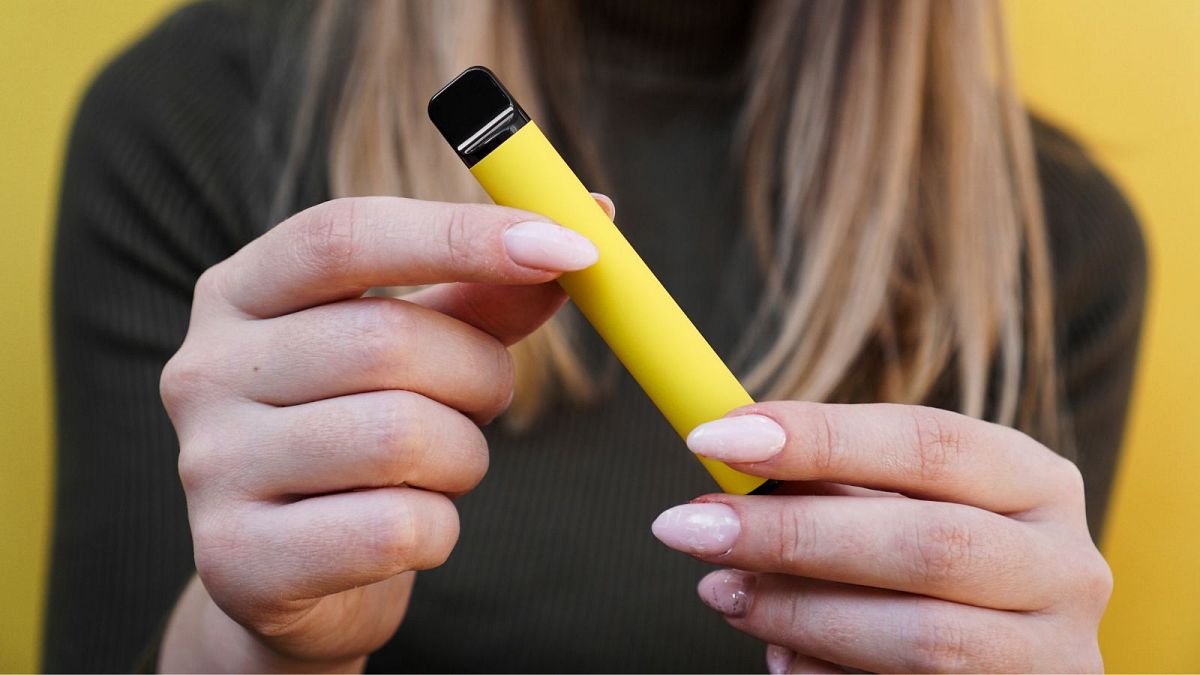The UK has announced a ban on disposable e-cigarettes, which have become popular among teens. Which other countries are cracking down?
When e-cigarettes first came to the market, they were advertised as the lesser of two evils, helping people move away from traditional cigarettes and the health risks associated with smoking.
But in more recent years, vapes have become something of a trend among young people. The single-use vape - also known as a “puff bar” - is practically an accessory item, and an increasing number of teenagers can be seen donning the flashy stick.
Several countries around the globe are considering banning them to curb the phenomenon.
UK
British prime minister Rishi Sunak announced that disposable vapes will be banned in the UK in a bid to curb youth smoking.
"The long-term impacts of vaping are unknown and the nicotine within them can be highly addictive, so while vaping can be a useful tool to help smokers quit, marketing vapes to children is not acceptable," Sunak said.
The implementation of new regulations will limit the variety of vape flavours, implement plain packaging, and alter the way vapes are presented in stores to minimise their appeal to children, according to the UK government.
"These changes will leave a lasting legacy by protecting our children’s health for the long term," Sunak added as the new law will make it illegal to sell tobacco products to teenagers under the age of 15.
In the Scottish and the Welsh governments, voices have been increasingly calling for a ban since last year and urged the UK government to take action.
Its decision comes after a consultation on smoking and vaping, which was launched in October last year and highlighted the rise in children and teenagers among vape users.
The move also has environmental considerations, as 5 million vapes are discharged in the UK every week.
EU member states
Ireland is seeking people's views ahead of a potential ban while many health and environmental associations are urging the government to act.
For example, VOICE Ireland has been very vocal on the issue, launching a petition and promoting the campaign #BanDisposableVapes on social media to make Ireland “the first country in Europe to ban disposable vape”.
Germany also intends to take action against disposable e-cigarettes. Some ecologists - including Steffi Lemke, the Green federal Minister of the Environment - have gone further, wanting to ban them from the EU altogether.
"Disposable e-cigarettes litter the environment and often end up in household waste instead of being properly disposed of as electrical appliances," Lemke told the German newspaper Mitteldeutsche Zeitung.
"They can also cause serious problems in the disposal facilities due to fires," she added.
Even France, the home country of all cigarette clichés, announced a vape crackdown while Belgium is awaiting the EU's green light to prohibit them.
Sold between 8 and 12 euros at tobacconists, on websites or in supermarkets, the "puffs" trend took off at the end of 2021 promoted on social media.
Containing between 0 and 20mg/ml of nicotine, disposable e-cigarettes were also criticised for leading young consumers towards regular cigarettes.
“We can be told that it is not nicotine. But it's a reflex, a gesture that young people are getting used to. Then that's how they go towards smoking and we have to stop that", said former French prime minister Elisabeth Borne when she announced the ban.
A ban already effective in Australia and New Zealand
New Zealand, known for its strict anti-tobacco guidelines, has had an effective ban in place since August this year.
The country has cracked down on vaping with a new set of rules to protect young people, like a lower level of nicotine, duller flavour names and an interdiction to open vape shops in the vicinity of schools, the Health Ministry has announced.
“We recognise we need to strike a balance between preventing young people from starting to vape, at the same time as having vapes available as a cessation tool for those who genuinely want to give up smoking”, said Dr Ayesha Verrall, New Zealand health minister.
The restrictions came a month after Australia announced similar measures on vaping, as the government accused the tobacco industry of trying to get the next generation of teenagers "hooked on nicotine".
How bad are single-use vapes for health?
Invented in 2019, single-use vapes usually come with coloured packages and quickly gained popularity among teens, first in the US. The trend quickly crossed the Atlantic.
The Financial Times reported that 14 per cent of English teenagers aged between 14 and 17 years old use vapes more than once a week.
In wider Europe, the numbers are also booming with a French survey highlighting over one teen out of 10 has tried vaping.
Single-use e-cigarettes’ sweet flavours are the most compelling marketing argument for younger consumers.
According to the tobacco industry watchdog organization STOP, the combination of fruity flavours, fun packages and promotion by social media influencers are destined to target and hook a new generation of users as "replacement smokers".
The survey highlighted that in France, 17 per cent of teens were using single-use devices, then shifted to other products.
With an increasing amount of research, it’s becoming clear that single-use vapes are far from harmless. As with electronic cigarettes, most single-use vapes contain the highly addictive nicotine.
Almost half of the daily users are experiencing side effects such as coughing, shortness of breath and heart palpitations, the organisation Drugwatch reported.
Though the extent of the long-term effects isn’t currently known due to a lack of medical research, one study showed that extended use of vaping products can significantly impair the function of the body’s blood vessels, increasing the risk for cardiovascular disease.



